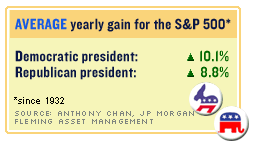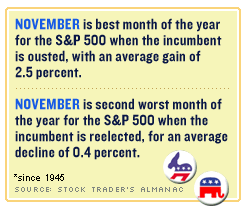NEW YORK (CNN/Money) - A John Kerry victory might be good news for Wall Street, despite what your average banker tells you.

There are a number of elements to the bullish case for a Kerry presidency. Kerry's vow to aggressively cut the deficit and roll back certain taxes might slow consumer spending and keep interest rates low, which would lift bond prices.
In addition, Kerry's pledge to increase tax breaks to the middle class could fuel consumer spending, help the economy along, and lead to stock gains.
Realistically, Kerry will have to contend with a Republican-controlled Congress. Such a scenario can result in political gridlock -- annoying for politicians but good for markets as the Clinton years showed.
On the flip side, some of Kerry's proposed policies don't seem quite as stock market friendly, compared to Bush.
Kerry wants to raise taxes on long-term capital gains to 20 percent from 15 percent and the top rate on dividends to 39.6 percent from 15 percent, which would reduce after-tax investment gains. Kerry has also vowed to roll back the Bush tax cuts for those earning more than $200,000 a year and to increase tax breaks to the middle class.
In terms of individual stocks and sectors, Kerry's policies are seen as boosting alternative energy stocks, technology, and middle and low-end retailers. On a smaller level, biotechs that deal in stem cells would gain, as Kerry has supported using stem cell research.
Kerry is expected to scale back defense spending, which would impact the underlying defense stocks. Big pharma stocks would be hurt by Kerry proposals such as lowering Medicare reimbursement rates for prescription drugs and legalizing the reimportation of prescription drugs from Canada and elsewhere.
Kicking out the incumbent
Historical trends show the stock market gains in November and December when an incumbent is ousted.

The year after the election is not traditionally a strong one for the market regardless of who is in power, but it tends to be better when the incumbent party is re-elected (see chart).
First years of Democratic administrations tend to be better than first years of Republican administrations.
Since 1945, the S&P 500 gained 5.4 percent on average in the first year of a presidential term. But the gain rose to 14.2 percent in the first year of a Democratic administration. The S&P 500 lost 2.4 percent, on average, in the first year of a Republican's term.
On a year-by-year basis, stocks gain more under Democrats (see chart). So longer term, Kerry would be better for markets.
Does it matter either way?
"Not as much is going to change as people might think," said Jeff Kleintop, chief investment strategist at PNC Advisors.

He said certain stocks and sectors will benefit depending on which party is in power, and regulatory agencies would likely see new leadership.
However, "Kerry paired with a Republican-controlled congress means there there's not much room for sweeping legislative changes," Kleintop added.
In addition, high energy prices and a slowly recovering economy and labor market will likely continue keeping investors on edge.
"Historically, markets are much more interested in things like how the economy is doing and what interest rate policy is than who is in power," said Charles Blood, Director of Financial Markets Strategy at Brown Brothers Harriman.
He thinks the market will have a good year in 2005, regardless of who wins.

"If you're looking at a point where the economy is in a growth period, and the Fed is not tightening too aggressively, you'll see a good year for stocks," he said.
The Federal Reserve is expected to boost rates for the fourth time this year when it meets November 10, but is not expected to raise rates aggressively next year.
"I think we paid a price this year (due to the interest rate tightening), and will get a better year next year, regardless of which party wins the election," he added.

|